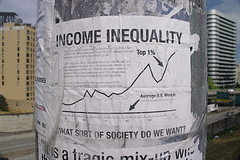
Making a similar but somehow altogether different argument is Richard Florida, who in a piece for CityLab, cites studies that find that the kind of income inequality that has developed in many urban areas over the past thirty years is a direct result of those cities’ style of economic growth. The studies say highly educated populations and greater industrial specialization (“skill-clustering”) tend to increase income inequality. Florida’s takeaway: inequality happens, but urban policymakers should still focus on devising ways to promote more inclusive cities and boost conditions for lower-income residents.
Even local officials who prefer to talk about the fiscal rebound that their cities have experienced, rather than their failings to extend that opportunity to growing numbers of poor residents, will not be able to accept escalating inequality as a byproduct of urban growth forever, because occasionally, displeasing byproducts of this inequality spill over into the streets (not good for PR). With an inequality gap that is only widening, the balance will eventually become untenable unless addressed.
This leaves us to find solutions, and as with most things, the two articles—and their supporting data—prove that what‘s really needed is a multi-faceted approach to addressing the conditions that create inequity in the first place. Florida advises against trying to lower inequality by impeding the urban growth that skill-clustering brings and “throwing the proverbial baby out with the bathwater” (though I’d suggest that in this instance, the baby has on a lifejacket and should be just fine, even without so much public help). He suggests policymakers “boost the conditions of people at the bottom of the economic ladder, enhancing skills, upgrading low-end service jobs, and raising the minimum wage, as well as increasing the supply of housing, particularly affordable housing.”
The solutions in Treuhaft’s piece also center around policy, including more equitable tax policies to ensure the benefits of growth are broadly shared, better access to education and opportunity for low-income children, social investment in skill development, health care, and child care for low-income and vulnerable lower middle–class households.
All of these solutions are valuable, but we should take care to ensure that lower and lower-middle income people who want to become a part of these highly educated skill clusters, are able. Education policy must include real, affordable options for higher education in urban centers, for residents (for example, President Obama's announcement today of a proposal that would provide two years of free community college for students).
If we step back from the data, we’re talking about people, the majority of whom are younger adults, who for reasons financial and familial, oftentimes must stay close to home. If our urban centers are indeed rising as hubs of innovation, startups and economic growth, let’s harness that power and encourage these industries to invest financial and human capital in order to have a qualified talent pool that is in their backyard—and knows the neighborhood.
(Photo credit: Flickr user mSeattle, CC BY 2.0)





Comments